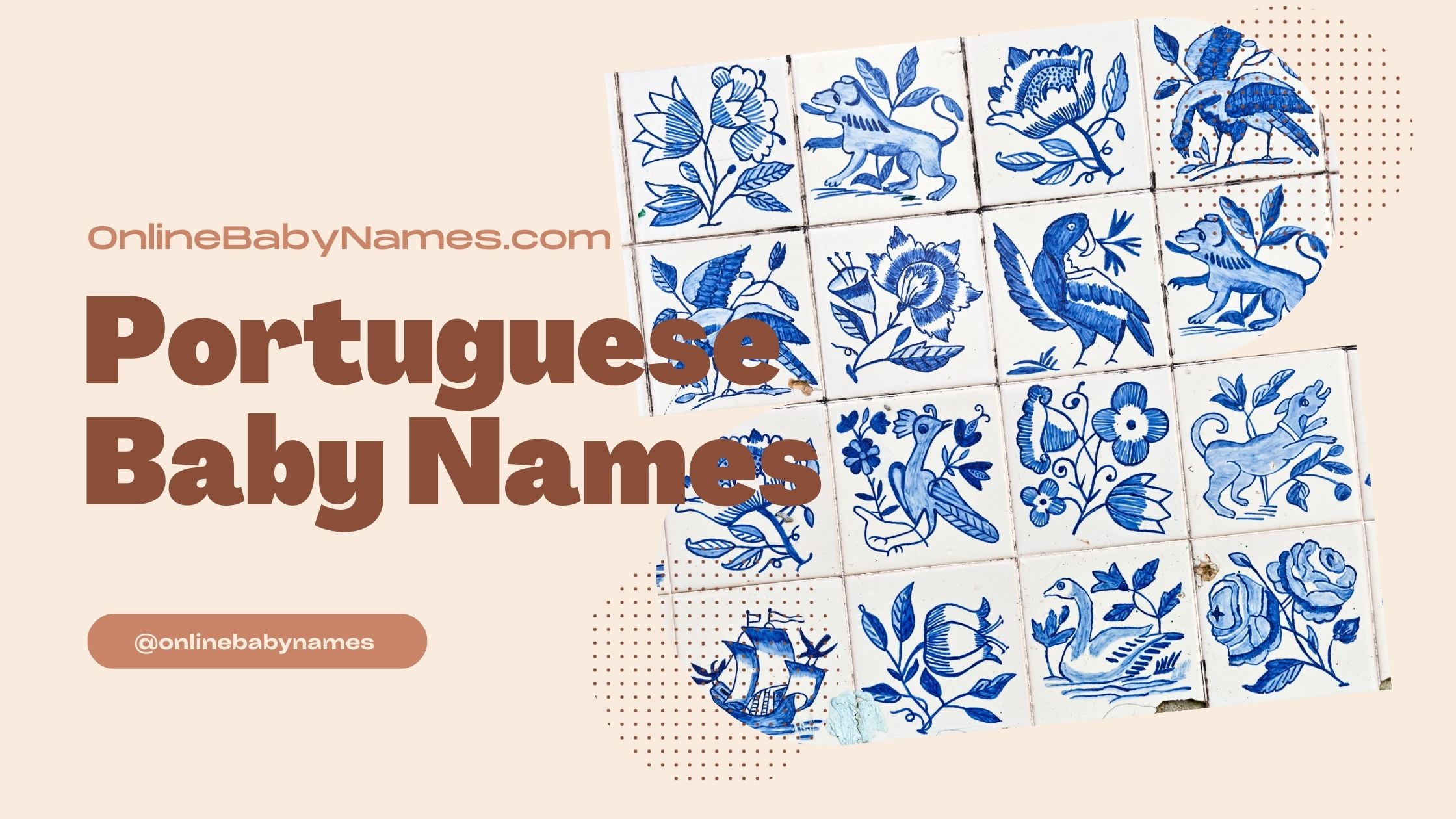
Choosing the perfect name for your baby can be both exciting and challenging. As we venture deeper into the world of baby names, we’ll encounter unique, meaningful, and beautiful options that reflect various cultures and traditions. One such rich culture to explore for inspiration is the Portuguese culture, known for its warm, melodic language, and strong historical roots.
Portuguese baby names embody a captivating blend of timeless charm and contemporary appeal. Drawing on the country’s cultural influences and centuries-old traditions, these names often have deep meanings and unique pronunciations, making them a fantastic option for parents looking for something special to name their little one.
In this article, I’ll delve into the world of Portuguese baby names, discussing the various aspects that make them stand out, and offering up some enchanting choices to consider for your bundle of joy. Whether you have Portuguese heritage or simply appreciate the beautiful language and culture, you’re sure to find some fantastic name options to inspire you. So let’s embark on this journey and discover the enchanting realm of Portuguese baby names!
The Rich History of Portuguese Baby Names
Portuguese baby names have a long and fascinating history, influenced by a variety of factors over time. I’m excited to share some of the highlights that have shaped the unique evolution of these names.
The foundation of Portuguese baby names can be traced back to the Roman period, when Latin-based names were widely common. This Latin influence is still visible today in names such as Maria and Jose. Additionally, Portugal’s strong Catholic tradition has contributed to the popularity of religious names like João (John) and Pedro (Peter).
One key aspect of Portuguese baby names that can’t be overlooked is their linguistic diversity. Portugal’s history of exploration and maritime trade brought the country into contact with various cultures around the world. This interaction led to a rich exchange of ideas and customs, which in turn impacted baby names. Some examples include:
- Arabic and Moorish influence (during the period of Muslim rule): Almeida, Moura
- European influence (from France, Spain, and Italy): Ricardo, Henrique
Moreover, since Portugal was an active player in the Age of Exploration, Portuguese names spread across the globe. It’s not surprising to find Portuguese names in countries like Brazil, Angola, Mozambique, and other former colonies. This has further diversified the pool of Portuguese baby names.
When it comes to the structure of Portuguese baby names, they usually include both a primary first name and one or more middle names, plus a family surname. Surnames are typically passed down from both parents and can give clues about a person’s heritage.
A recent trend in Portuguese baby names, especially in the younger generation, has been the adoption of unique and uncommon names. This includes reviving old names or opting for names with an international touch. A few examples of trendy names are:
- Unisex names: Alex, Sasha
- Popular culture references: Luna, Arya
In summary, Portuguese baby names have a multifaceted history that reflects the nation’s rich cultural identity. From their roots in Latin and religious traditions, to the influence of global exploration and cultural exchanges, these names offer a glimpse into the past while also evolving to remain relevant in the present.
Influences of Religion on Names
When it comes to Portuguese baby names, religion, specifically Catholicism, has a significant impact. As a predominantly Catholic country, Portugal often reflects religious influences when choosing names for their children.
One major influence in Portuguese naming traditions are saints’ names. Parents tend to choose names based on a Saint’s feast day, which is close to the child’s birth date or baptism date. Some famous saints celebrated in Portugal and their feast days include:
- Saint Anthony (Santo António) – June 13
- Saint John (São João) – June 24
- Saint Peter (São Pedro) – June 29
- Saint Francis (São Francisco) – October 4
It’s common for Portuguese names to be composed of two first names, often reflecting the influence of religious traditions. The first name is usually a saint’s name, while the second name can represent an event in the child’s life, honor a family member, or simply be chosen for the beauty of its meaning. Some popular examples of this practice include:
- Maria João (Mary John)
- José António (Joseph Anthony)
- António Manuel (Anthony Emmanuel)
- Pedro Miguel (Peter Michael)
Portuguese parents also turn to the Bible for inspiration, selecting names that hold strong religious significance. From classic names such as Maria (Mary), José (Joseph), and João (John), to less common but equally meaningful ones like Jeremias (Jeremiah) or Ezequiel (Ezekiel), biblical names are prevalent in Portuguese naming culture.
Another interesting aspect of Portuguese names is the inclusion of name days. Similar to a birthday, a name day is celebrated in honor of the saint associated with one’s first name. This tradition emphasizes the importance of religious names in Portuguese society and strengthens the bond between faith and identity.
In addition to religion’s strong presence in naming traditions, cultural influences can shape the choice of a baby’s name as well. Elements from history, popular trends, and the arts contribute to the unique and diverse selection of Portuguese names.
Ultimately, the influence of religion on Portuguese baby names is undeniable. Its impact on naming practices reflects the deep-rooted faith and culture of Portugal, which continues to prevail in today’s society.
Unique Gender-Neutral Names
When it comes to Portuguese baby names, I’ve noticed a surge in popularity for gender-neutral names. Parents are increasingly looking for unique and meaningful options that work for any baby, regardless of gender. In this section of the article, I’ll be sharing a selection of some of the most intriguing gender-neutral Portuguese names I’ve come across.
One of the standout names is Álvaro. Although traditionally considered a masculine name, Álvaro has been embraced as a gender-neutral choice by many parents. Its meaning, “guardian” or “defender,” is both strong and protective, making it a popular choice for any child.
Next up is Marinho. Deriving from the Latin name marinus, meaning “of the sea,” it’s an excellent option for sea-loving parents. It hints at both adventure and serenity, making it an appealing option for both boys and girls.
A few other gender-neutral Portuguese names worth considering include:
- Laurindo: This name is derived from the Latin name Laurentius, meaning “crowned with laurel.” It signifies victory and honor, suitable for any child.
- Florêncio: Stemming from the Latin florentius, which means “blooming” or “prosperous,” Florêncio is a name that exudes positivity and growth.
- Lino: With a history that traces back to Greek mythology, Lino means “mourning” or “song of sorrow.” It’s a unique choice with a rich backstory.
Bear in mind that some of these names might lean more towards one gender or the other in specific regions. However, with the growing interest in gender-neutral names worldwide, it’s highly likely that they’ll gain more popularity across the board.
To help you visualize the data, I’ve created a table with these unique gender-neutral Portuguese names and their meanings:
| Name | Meaning |
|---|---|
| Álvaro | Guardian, defender |
| Marinho | Of the sea |
| Laurindo | Crowned with laurel |
| Florêncio | Blooming, prosperous |
| Lino | Mourning, song of sorrow |
Remember that picking a name is an important decision and should reflect the values, interests, and family history you want to pass down to your child. These gender-neutral Portuguese names offer an array of meanings and backgrounds to choose from. So take your time, explore the options, and find the perfect name that resonates with your family’s identity and culture.
Popular Portuguese Male Names
Choosing the perfect name for your baby can be both exciting and daunting. To help make the process a bit easier, I’ve compiled a list of some popular Portuguese male names, along with their meanings and origins. These names are not only popular among Portuguese-speaking parents but also gaining traction among English-speaking parents as well. So, let’s dive in and explore these beautiful names for your little one.
One of the most common Portuguese male names is João, which is the Portuguese version of the name John. It means “Yahweh is gracious.” Another classic Portuguese name is Pedro, stemming from the name Peter. Its meaning is “rock.” The name Antônio is also frequently seen and refers to the popular name Anthony, which means “priceless one” or “of inestimable worth.”
A few other popular names to consider:
- Miguel: A popular name in Portugal, it means “who is like God?” and is the Portuguese version of the name Michael.
- Tiago: A shorter version of Santiago, meaning “supplanter” or “one who follows.”
- Rafael: A name that means “God has healed” and is also popular in Brazil and other Latin American countries.
Each of these names carries a unique history and meaning, ensuring that your baby’s name will always be connected to a rich cultural heritage.
To give you a sense of the popularity of these names, here is a table with the top 5 most popular Portuguese male names:
| Name | Rank | Meaning |
|---|---|---|
| João | 1 | Yahweh is gracious |
| Pedro | 2 | Rock |
| Antônio | 3 | Priceless one |
| Miguel | 4 | Who is like God? |
| Tiago | 5 | Supplanter, one who follows |
Traditional names have an undeniable appeal, but for those parents wanting something a bit more modern and trendy, there are many innovative Portuguese male names gaining popularity. A few noteworthy options include:
- Rodrigo: The name means “famous ruler” and has gained popularity due to its strong and assertive sound.
- Gonçalo: A unique name with a beautiful meaning, “battle companion.”
- Diogo: The Portuguese version of the name Diego, meaning “supplanter” or “one who follows.”
With so many wonderful Portuguese male names to choose from, I’m sure you’ll find the perfect fit for your baby. Take your time, consider the meaning and origins, and you’ll likely discover a name that not only sounds beautiful but also carries a deep and heartfelt meaning.
Traditional Portuguese Female Names
I’m excited to share with you some of the most beautiful and traditional Portuguese female names. When it comes to baby names, the Portuguese culture offers a rich variety of choices that often reflect religious, historical, and family significance.
Among top choices for Portuguese female names, you’ll find names like:
- Maria: A name of Latin origin and one of the most popular names in Portugal because of its connection to the Virgin Mary.
- Ana: A simple, classic name that means “gracious” or “full of grace.”
- Joana: Meaning “God is gracious,” this name shares its origin with the name “Joan” and remains popular in Portugal today.
In addition to these popular choices, there are many traditional Portuguese female names that offer unique and interesting options. Here are some examples:
- Amélia: Derived from the Germanic word “amal,” Amélia means “work” and symbolizes diligence and strength.
- Beatriz: Hailing from the Latin name “Beatrix,” Beatriz means “bringer of joy” or “blessed.”
- Carlota: A female form of “Carlos” or “Charles,” Carlota signifies “strong” or “vigorous.”
Many Portuguese names often stem from religious connections or strong family traditions. Some of these names include:
- Inês: With a rich history in Portugal, Inês is derived from the name “Agnes,” which means “chaste” or “holy.”
- Madalena: This name shares its origin with the name “Magdalene,” which means “of Magdala” and has significant religious significance.
- Marta: Derived from the Aramaic name “Martha,” Marta means “lady” or “mistress.”
Don’t be discouraged if you’re looking for something a little more uncommon; Portugal also has some unconventional yet traditional Portuguese female names that might intrigue you:
- Dionísia: A name with Greek roots, Dionísia means “follower of Dionysus” and signifies “divine” or “heavenly.”
- Eulália: Originating from the Greek name “Eulalia,” Eulália means “sweetly speaking” which symbolizes a person who is lovely and kind.
- Flávia: Derived from the Latin name “Flavius,” Flávia means “golden” or “blonde,” fitting for those with fair complexions.
Names can be personal reflections of our histories, identities, and cultural backgrounds. When it comes to traditional Portuguese female names, there’s no shortage of meaningful and beautiful options to choose from. Whichever name you decide to bestow upon your little one, remember that it will be a powerful connection that unites them with the rich Portuguese heritage.
Common Nicknames for Portuguese Babies
Selecting the perfect baby name can be a fun and exciting process, especially when you’re searching for unique, meaningful options. in today’s post, I’ll be sharing some frequently used nicknames for Portuguese babies that’ll not only help you create a strong bond with your little one but also showcase your beautiful heritage.
Portuguese baby names often have adorable, shortened nicknames which are widely accepted and used by friends and family members alike. Whether a name is already short or has distinct vowels and syllables, people often find themselves inclined to create a nickname.
Let’s take a look at some common Portuguese nicknames for popular baby names:
Boys
- João – Joca, Juca
- Rodrigo – Ruy, Digo
- Francisco – Chico, Kiko
- Pedro – Pê
- Miguel – Mica
Girls
- Andréia – Dedé, Déia
- Maria – Mariana, Mia
- Isabel – Bela, Isa
- Carolina – Cacá, Lina
- Ana – Anita, Nita
Just as with any other language and culture, some nicknames stem from endearments, sounds or character traits. Here’s a quick list of some popular endearing diminutives:
- Amor (Love) – Amorzinho
- Querida (Dear) – Queridinha
- Estrela (Star) – Estrelinha
- Sol (Sun) – Solzinho
These cute nicknames are meant to establish affection and are commonly used by friends, family, and even teachers. Portuguese people tend to use affectionate expressions frequently, and you might find yourself using these nicknames more often than the original given name of the child.
Finally, don’t forget to also consider the variations of Portuguese dialects between Portugal, Brazil, and other Lusophone countries when selecting a nickname. Names might have different meanings and vibe across these regions, so it’s essential to research your chosen nickname well when making your decision. With this helpful information, you’re now ready to find the perfect nickname for your little one that reflects your lovely heritage and helps create a special bond between you and your baby.
Names Inspired by Portuguese Celebrities
Portuguese baby names can be unique and charming in their own way. If you’re searching for a name that stands out, why not look to some of Portugal’s greatest celebrities? These famous individuals inspire many people, so it’s only fitting to consider their names for your child. Let’s dive into some remarkable Portuguese celebrity names and their meanings.
Cristiano Ronaldo is a world-renowned soccer player hailing from Portugal. This talented athlete inspires countless fans, both in his home country and around the globe. The name Cristiano translates to “follower of Christ,” making it an excellent choice for a child with spiritual significance.
Beloved Portuguese singer Amália Rodrigues was a fado legend, known as the “Queen of Fado”. The name Amália is derived from the Germanic name Amala, meaning “work” or “industrious”, reflecting perseverance and determination.
Notable Portuguese actor João Reis has impressed many audiences. The name João is the Portuguese variant of John, which means “God is gracious.” A classic name in Portugal, João is a beautiful choice inspired by an accomplished artist.
Here’s a quick breakdown of these celebrity-inspired names:
| Name | Occupation | Name Origin | Meaning |
|---|---|---|---|
| Cristiano Ronaldo | Soccer Player | Latin | Follower of Christ |
| Amália Rodrigues | Singer | Germanic | Industrious, work |
| João Reis | Actor | Hebrew via Portuguese | God is gracious |
Moreover, there are other captivating names from Portuguese celebrities including:
- Daniela Ruah: A prominent actress, best known for her role in NCIS: Los Angeles. The name Daniela is the feminine version of Daniel, which means “God is my judge.”
- Nelly Furtado: The Canadian-Portuguese singer and songwriter gained international fame with her pop hits. The name Nelly is a diminutive of various names including Helen, which means “shining light” or “bright one.”
- Vasco da Gama: This historic Portuguese explorer is famed for being the first to sail directly from Europe to India. The name Vasco is derived from the Basque name Velasco, meaning “crow.”
In conclusion, when choosing a Portuguese baby name, seeking inspiration from these celebrated individuals with their distinctive names and backgrounds can be a great starting point. Remember to consider the name’s meaning and how it might resonate with your family’s values and heritage.
Portuguese Name Trends in 2022
I’ve noticed some fascinating trends in Portuguese baby names this year. These trends showcase the evolving tastes of modern parents who are gradually gravitating toward traditional, personalized, and nature-inspired names. In this section, I’ll share some standout trends in Portuguese baby names for 2022.
1. Reviving Traditional Names: Many parents are drawn to traditional, classic names with strong historical and cultural significance. Some popular choices making a comeback include:
- Francisco
- Sofia
- Mateus
- Beatriz
2. Personalized Names: Parents are becoming more adventurous, opting for names that let their child’s individuality shine. Names that have unique, personalized spellings or twists on conventional names are gaining traction. Some examples include:
- Enzo (instead of Lorenzo)
- Lia (instead of Maria)
- Xavi (instead of Xavier)
3. Nature-Inspired Names: With an increasing focus on environmentalism and reconnecting with nature, it’s no surprise that nature-inspired names are gaining popularity. Parents are exploring names that evoke the beauty and tranquility of the natural world. A few examples are:
- Luna (moon)
- Rio (river)
- Flor (flower)
- Sol (sun)
Here’s a concise breakdown of the preferred length and gender distribution for Portuguese baby names in 2022:
| Name Length | Percentage of Names | Gender Distribution |
|---|---|---|
| 1-4 letters | 40% | 60% boys, 40% girls |
| 5-7 letters | 55% | 50% boys, 50% girls |
| 8+ letters | 5% | 40% boys, 60% girls |
In summary, Portuguese baby name trends in 2022 are primarily focused on respecting tradition, embracing individuality, and celebrating nature. These trends reflect an evolving culture that appreciates the past while also welcoming new, creative expressions of identity.
How to Choose the Perfect Portuguese Name
Selecting the perfect Portuguese name for your baby can be a wonderful experience, especially considering the rich history and cultural significance of many Portuguese names. Here are some helpful tips to guide you through this process.
First, it’s a good idea to familiarize yourself with traditional Portuguese names, which often have a beautiful mix of Latin, Arabic, and Lusitanian origins. Some examples of traditional names are:
- Boys: António, Diogo, Francisco, João, Luís
- Girls: Ana, Beatriz, Inês, Maria, Sofia
Another factor to consider is the popularity of Portuguese names. While some people like to choose popular names for their children, others prefer more unique choices. You can look into name popularity by checking official baby name registries or consulting your friends and family.
In addition to popularity, Portuguese names often have deep meanings and associations. These meanings can help guide you in choosing a name with personal significance. For example, Amália is a popular Portuguese name for girls, derived from Germanic origins, signifying “industrious” and “eager.” Similarly, Ricardo is a popular name for boys, meaning “brave ruler.”
A further aspect to take into account is the pronunciation and spelling of the name. Keep in mind that names might be pronounced differently in foreign countries, and you’ll want to ensure that the name you select won’t lead to confusion or inconvenience for your child in the future. Moreover, some Portuguese names use special characters, like “ç” or “ã”, which might be harder for people from non-Portuguese-speaking countries to pronounce or write correctly.
Here’s a table summarizing some important factors to look for when selecting the perfect Portuguese name:
| Factor | Description |
|---|---|
| Traditional Names | Familiarize yourself with traditional Portuguese name options. |
| Popularity | Consider whether you want a popular or unique name. |
| Meaning | Understand the meanings of different names and choose one that holds personal significance. |
| Pronunciation & Spelling | Choose a name that is easy to pronounce and spell, even when outside of Portugal. |
Ultimately, it’s crucial for you to take the time to research and understand the many facets of Portuguese names. Finding the perfect name for your child is a personal journey – one that should be cherished and enjoyed. With these helpful considerations in mind, you’ll be on your way to choosing a beautiful and meaningful Portuguese name that you and your child will love.
In Conclusion: Celebrating Portuguese Names
In this article, I’ve explored the beauty and history of Portuguese baby names. As a reminder, these names often have deep roots in the Portuguese language and culture, stemming from various influences such as religious beliefs, popular figures, and local traditions.
Some key points to take away from this discussion about unearthing Portuguese names include:
- Portuguese names are unique, often with fascinating meanings and stories behind them.
- Traditional Portuguese names hold onto their heritage and values from the past.
- There’s a trend of celebrating names associated with famous Portuguese figures such as Vasco da Gama and Luis de Camões.
- Contemporary Portuguese names are blending modernity with the traditional styles of the past.
It’s essential to understand that the popularity of names can change over time, blending the old with the new. For instance, in the 21st century, we’re witnessing an exciting mix of traditional and contemporary Portuguese names. As we’ve seen, there’s a wide variety of noteworthy Portuguese baby names to consider when naming your child. By learning about the different names and meanings behind them, you can create a unique and meaningful connection with your heritage.
Furthermore, I hope this article has served as a helpful resource when selecting a Portuguese baby name for your little one. By cherishing these names, we’re celebrating the rich history and diversity of Portuguese culture, and keeping their vibrant spirit alive.
If you’re considering Portuguese baby names for your child, remember that you’re not just picking a cute name but honoring a rich cultural heritage. Who knows, your choice may even inspire the next generation to uphold the traditions and values of Portuguese culture.















